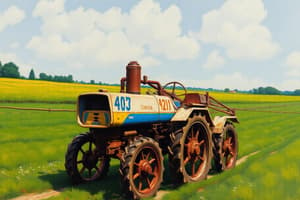Podcast
Questions and Answers
What is the primary purpose of mechanization in farming?
What is the primary purpose of mechanization in farming?
- To increase the use of simple farm tools
- To promote the use of crude implements
- To reduce the production of crops
- To replace human or animal labor (correct)
What is an advantage of farm mechanization?
What is an advantage of farm mechanization?
- It reduces on-farm output and income
- It saves time and labor (correct)
- It discourages large-scale farming
- It increases soil compaction
What is a disadvantage of farm mechanization?
What is a disadvantage of farm mechanization?
- Machinery can be expensive to purchase or hire (correct)
- It promotes cooperation among farmers
- It reduces farm health hazards
- It increases the amount of manual farm work
What is an example of a soil cultivation implement?
What is an example of a soil cultivation implement?
What is the level of mechanization when mechanical power used is 67 to 100%?
What is the level of mechanization when mechanical power used is 67 to 100%?
What is the purpose of planting machines?
What is the purpose of planting machines?
What is a negative impact of heavy farm machines on soil?
What is a negative impact of heavy farm machines on soil?
What is a reason why farmers may choose to cooperate with each other?
What is a reason why farmers may choose to cooperate with each other?
What is the primary function of a plough?
What is the primary function of a plough?
What is the main purpose of a subsoiler?
What is the main purpose of a subsoiler?
Which equipment is used for watering crops on large farms?
Which equipment is used for watering crops on large farms?
What is the primary function of a cultivator?
What is the primary function of a cultivator?
What is the purpose of a cultipacker?
What is the purpose of a cultipacker?
What is the primary function of a harrow?
What is the primary function of a harrow?
What is a common use of a tractor?
What is a common use of a tractor?
Which equipment is used for collecting crops?
Which equipment is used for collecting crops?
What is the purpose of a seed drill?
What is the purpose of a seed drill?
What is the function of a combiner harvester?
What is the function of a combiner harvester?
What is the purpose of a milking machine?
What is the purpose of a milking machine?
What is the purpose of a sprayer?
What is the purpose of a sprayer?
What is the purpose of an incubator?
What is the purpose of an incubator?
What is the purpose of pruning shears?
What is the purpose of pruning shears?
What is the purpose of a feed miller/grinder?
What is the purpose of a feed miller/grinder?
What is the purpose of a milk cooler?
What is the purpose of a milk cooler?
Flashcards are hidden until you start studying
Study Notes
Mechanized Farming
- Mechanization in farming involves the use of machinery to replace human or animal labor for agricultural land development, crop production, harvesting, storage, animal rearing, and product processing.
Advantages of Farm Mechanization
- Saves time
- Reduces the difficulty in farming
- Saves labor
- Reduces farm health hazards
- Encourages large-scale farming
- Increases on-farm output and income
- Encourages cooperation among farmers
Disadvantages of Farm Mechanization
- Machinery can be expensive to purchase or hire
- Machinery driven by fossil fuels cause environmental pollution
- Trafficking by heavy farm machines causes soil compaction and poor root growth
- May hamper social capitals of farmers
- Reduces manual farm work available for workers
- Requires continuous supplies of energy from fuel and electricity
Levels of Mechanization
- Low-level mechanization: manual power exceeds 33%
- Fair-level mechanization: animal power used is 34 to 66%
- High-level mechanization: mechanical power used is 67 to 100%
Types of Farm Tools and Equipment
- Soil cultivation implements (e.g., tillers, disk harrows, moldboard ploughs)
- Planting machines (e.g., Seeder)
- Harvesting equipment (e.g., combine harvester, diggers, pickers)
- Irrigation machinery (e.g., central pivot irrigation systems, pump units)
- Feed processing equipment (e.g., weighing scale, shovel, wheelbarrow, baler, chopper, millers or grinders, mixers)
- Dairy machinery (e.g., buckets, Milk containers, Automatic milking machines, Coolers, pasteurizers, Homogenizer, cream separator, batch mixers, continuous freezers, butter churner, cheese molder)
Uses of Farm Tools and Equipment
- Tractor: used for planting, tilling, spreading fertilizer, etc.
- Plough: cultivates soil and prepares it for sowing
- Subsoiler: breaks up and loosens soil during deep tillage
- Cultivator: used for secondary tillage, removing weeds, and pulverizing soil
- Cultipacker: crushes soil clods, eliminates cracks, and forms a smooth seedbed
- Harrow: smooths out and breaks up soil surface
- Seed drill: plants seeds at equal distance and proper depth
- Sprinkler: irrigates a field of crops
- Combine harvester: harvests grain crops efficiently
- Straw collector: collects straw or hay into stacks
- Feed miller/grinder: reduces grains to coarse meal for animal feeding
- Milking machine: harvests milk automatically
- Milk cooler: cools milk to below 4°C within 2 hours of milking
- Incubator: keeps fertile eggs warm for 21 days of incubation
- Sprayer: sprays liquid insecticides, herbicides, pesticides, water, etc.
- Pruning shears: cuts branches of trees and plant stems
Studying That Suits You
Use AI to generate personalized quizzes and flashcards to suit your learning preferences.




